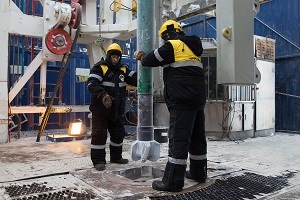 Back to the news list
Back to the news list
OPEC and its allies are expected to rebuff calls this week to fill in the supply gap left by falling oil exports from coalition member Russia.
The 23-nation group led by Saudi Arabia will probably ratify plans for another modest production increase scheduled for May when it meets on Thursday, according to a Bloomberg survey. Several delegates from the Organization of Petroleum Exporting Countries and its partners privately predict this outcome, and public comments from key nations point the same way.
Russian oil exports have plunged by a quarter as many international buyers boycott the country following its invasion of Ukraine. Companies including Shell Plc and TotalEnergies SE have pledged to halt purchases on the short-term market and wind down long-term contracts.

Illustrative image
With oil prices holding above $100 a barrel, a lack of additional supplies to compensate for Russian losses threatens to further stoke the inflationary surge that is endangering the global recovery and inflicting a cost-of-living crisis on millions. Major importers are urging OPEC+ nations with spare production capacity to open the taps faster, but the group’s key members have so far remained unmoved.
“We won’t add resources if the market is balanced, and the resources are in the market,” United Arab Emirates Energy Minister Suhail Al-Mazrouei said on Monday (March 28) at a conference in Dubai. Key consumers like the U.S. should trust the group’s judgment in how to best manage the market, he said the next day.
All 23 traders and analysts in a Bloomberg survey predicted the group will stick with its plan for an increase of 432,000 barrels a day in May. While that theoretically represents a slight increase from previous 400,000-barrel hikes as OPEC+ fine-tunes individual nations’ production quotas, most members have been struggling to deliver the full amount pledged for several months.
While Saudi Arabia and the UAE have indicated that their reluctance to pump faster stems from a belief there’s no shortage yet in world markets, the Persian Gulf heavyweights also seem to be acting out of loyalty to Moscow. “Russia is an important member” and OPEC+ should remain detached from politics, Al-Mazrouei said on Monday (March 28). The group isn’t concerned with whether Russian supply losses in particular are causing an imbalance, he added. The alliance adopted a similar approach when it last met, at the start of this month. Saudi Energy Minister Prince Abdulaziz bin Salman avoided any discussion of the Russian situation, and hurried the meeting to a conclusion after just 13 minutes.
Riyadh and Abu Dhabi are keen to preserve ties with Moscow, which have enabled them to bolster control over global crude markets and lessen their political reliance on the U.S. That’s particularly useful for Saudi Crown Prince Mohammed bin Salman, who has been sidelined by the Biden administration over the killing of journalist Jamal Khashoggi.

Source: Bloomberg
Allowing prices to trade in triple-digits has also boosted revenues across the OPEC+ coalition, replenishing coffers depleted during the economic slump of the pandemic. Saudi Arabia and the UAE “need to maintain close ties to Russia,” Paul Sankey, lead analyst at Sankey Research LLC, said in a Bloomberg television interview. If they change position without consulting Moscow, “it would end OPEC+.”
Staying the course will also have consequences, frustrating the Biden administration and other world leaders seeking to isolate President Vladimir Putin. It could also heighten the pain for consuming nations, which have called via the International Energy Agency for OPEC+ to relieve the market’s strain.
The de facto embargo on Russian supplies observed by many refiners and traders has undeniably left a hole, even as China and India discreetly continue purchases. Russia’s average crude output from March 16 to 27 dipped below 11 million barrels a day, a level not seen since the start of the year, according to calculations based on data from the Energy Ministry’s CDU-TEK unit seen by Bloomberg.
Global markets were under strain even before the invasion, as supplies failed to keep up with the vigorous recovery in fuel demand following the pandemic. Part of the problem lies with OPEC+ itself, which is struggling to revive all the output halted during the Covid slump, after reduced investment eroded capacity in members like Angola and Nigeria. Yet recent market developments also present a case for moving cautiously – the favored approach of Saudi Arabia’s Prince Abdulaziz.
Brent futures have lost about 7% this week, first as China re-imposed lockdowns to combat new Covid-19 outbreaks, then as Russia pledged to scale back military operations around the Ukrainian capital. The prospect of an influx of Iranian supplies continues to loom over the market, even if negotiations over a nuclear pact that would remove U.S. sanctions remain in limbo.
With so much uncertainty, OPEC+ may have taken the conservative choice even without the current political considerations. “Amid historic oil prices, fundamental and geopolitical whipsawing, the one constant is OPEC+’s determination to stick with its tapering plan,” said Bob McNally, president of Washington-based consultant Rapidan Energy Group and a former White House official.
Không thể sao chép